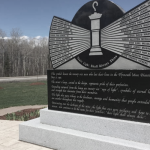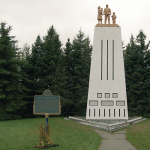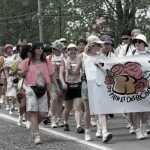Founded by the charismatic William Coaker, the FPU worked to provide fishers and their families with a greater share of the wealth that their labour produced. Democratic, and cooperative, the FPU was the first attempt to organize fishers as a political movement along class lines. With a rallying cry of “to each his own”, the FPU sought to win reforms in Newfoundland society and fairness in the distribution of wealth in the fishing industry.
At its peak, the FPU had more than 21,000 members in 206 councils across the island, representing a majority of Newfoundland’s fishers. It established the Fishermen’s Union Trading Company (UTC) that set up stores to buy fish and sell goods to fishermen at fair prices and free them from exploitation by the St. John’s merchant class. In 1916, it built Port Union, the only town in North America founded by a trade union.
[[{“fid”:”1430″,”view_mode”:”default”,”fields”:{“format”:”default”,”field_file_image_alt_text[und][0][value]”:”Town of Port Union, Newfoundland and Labrador”,”field_file_image_title_text[und][0][value]”:”Port Union, NL”},”type”:”media”,”field_deltas”:{“1”:{“format”:”default”,”field_file_image_alt_text[und][0][value]”:”Town of Port Union, Newfoundland and Labrador”,”field_file_image_title_text[und][0][value]”:”Port Union, NL”}},”link_text”:null,”attributes”:{“alt”:”Town of Port Union, Newfoundland and Labrador”,”title”:”Port Union, NL”,”class”:”media-element file-default”,”data-delta”:”1″}}]]
In 1912, the FPU adopted the Bonavista Platform, a manifesto that called for radical change in fishery policy, social policy and governance. Among its demands were co-operative marketing and regulation of the fishery, old age pensions, free education, a minimum wage, and democratic reforms aimed at lessening the influence of big money and the wealthy. The next year, it elected 8 members to the House of Assembly, including Coaker.
Over the next decade, Coaker and his party wielded influence over successive governments, with Coaker becoming Fisheries Minister in 1917. But extraordinary wartime conditions and the opposition of fish exporters prevented much of the FPU’s platform from being enacted. Powerful anti-union sentiment following the end of the First World War took the wind out of Coaker’s sails. He became less energetic in politics and more interested in managing the Union’s businesses.
The FPU faded away as a political force by the end of the 1920s and ended entirely with the suspension of responsible government in 1934. It carried on as a service organization for its members, running businesses and activities on behalf of fishers and loggers. It survived until 1977, when it fell into receivership and its last stores were sold.
While some like to portray the FPU as a failure, those with a sense of history know that it made Newfoundland a better place to live and work, and improved the lives of working families like no other political movement before, or since.
Today, the FPU’s legacy rests in the hands of the province’s unions and labour councils, and with the leadership of the Newfoundland and Labrador Federation of Labour.


